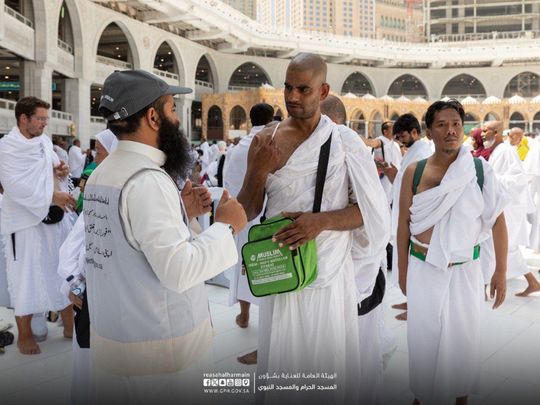
Cairo: Saudi authorities have cautioned Muslims, wishing to perform Umrah or minor pilgrimage in the kingdom, against carrying certain items while making the journey.
The kingdom’s Ministry of Hajj pointed out that fireworks are among the prohibited items.
The ministry specified the prohibited and restricted substances as laser, fireworks, fake currencies, and non-registered medicines.
“The Guest of God, before arriving at the entry points (in the kingdom), make sure you carry none of these substances,” the ministry said, addressing the pilgrims and listing the banned items.
The warning comes as the Umrah season at the Grand Mosque, Islam’s holiest site, in Mecca reaches its peak in Ramadan.
Umrah, which can be undertaken round the year, comprises two key rituals: Tawaf or the circumambulation of the Holy Kaaba; and Sa’i, which is walking seven times back and forth between the hills of Safa and Marwa located in the eastern part of the Grand Mosque.
Repitition banned
Saudi Arabia has banned repetition of performing Umrah during Ramadan to ease overcrowding. The Ministry of Hajj recently said no permit is issued for performing two or more Umrahs in Ramadan, urging the faithful to make do with one lesser pilgrimage with the aim of easing congestion, giving others the chance to undertake Umrah and helping in crowd management.
To cope with the influx in Ramadan, Saudi authorities have unveiled a series of measures to help worshippers perform rites smoothly and comfortably. They include allocating the circumambulation courtyard around the Holy Kaaba and the ground floor for Umrah pilgrims.
Furthermore, authorities have allocated certain gates of the sprawling mosques for pilgrims’ entry and exit to stave off overcrowding.
The numbers of Umrah pilgrims reached record 13.5 million last year, Saudi Minister of Hajj and Umrah Tawfiq Al Rabiah said in January.
In recent months, the kingdom, Islam’s birthplace, has introduced a host of facilities for overseas Muslims to come to the country to perform Umrah.
Muslims holding different types of entry visas such as the personal, visit and tourism visas are allowed to undertake Umrah and visit Al Rawda Al Sharifa, where the tomb of the Prophet Mohammad (Peace Be Upon Him) is located at the Prophet’s Mosque in Medina after booking an e-appointment.
Saudi authorities have also extended the Umrah visa from 30 days to 90. Women pilgrims are no longer required to be escorted by male guardians.
The kingdom has also said that expatriates residing in the Gulf Cooperation Council countries are eligible to apply for a tourist visa, regardless of their profession, and be able to perform Umrah.








